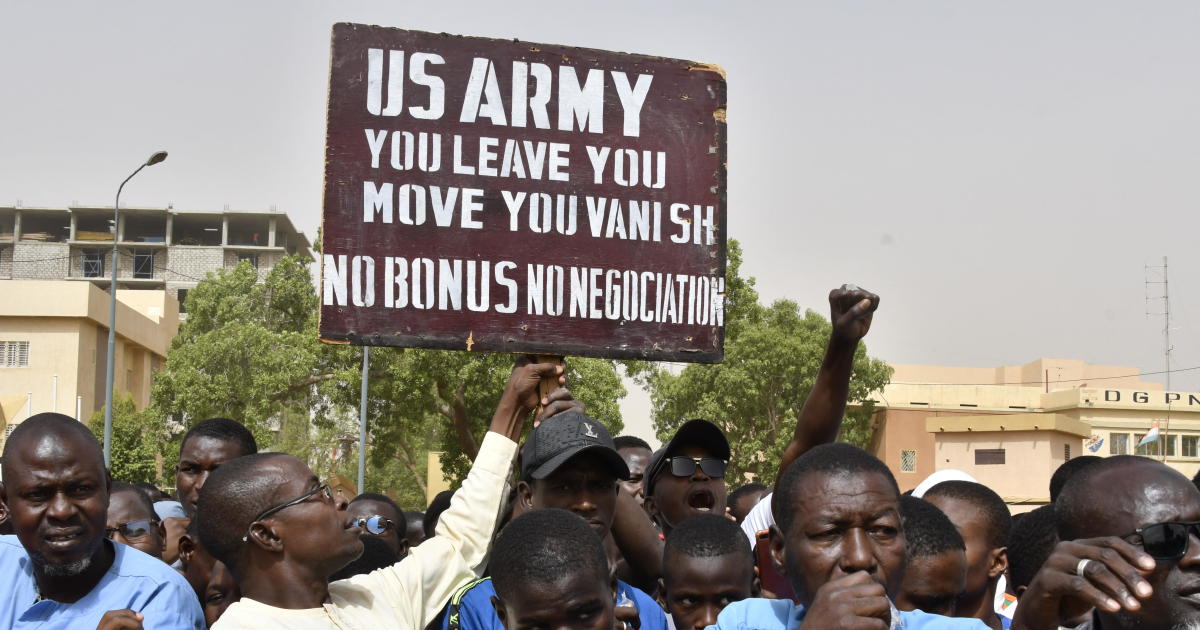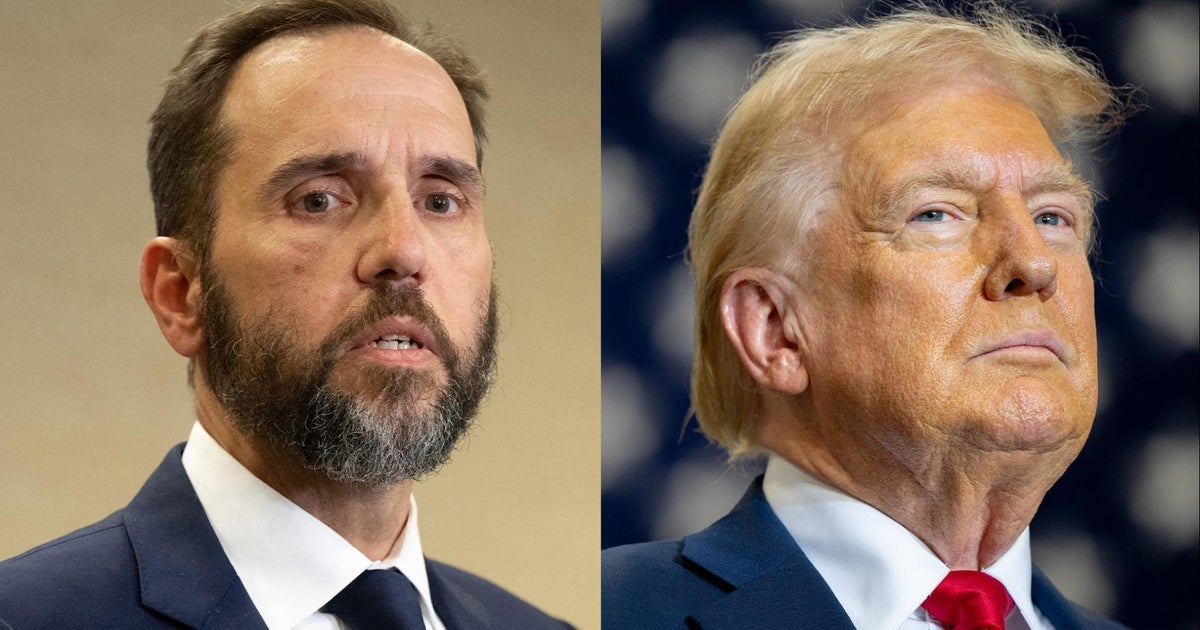CBS News
Why the military withdrawal from Niger is a “devastating blow” to the U.S., and likely a win for Russia

Johannesburg — After investing more than $1 billion in Niger over a decade, the U.S. military has agreed to withdraw its more than 1,000 forces from the West African nation over the next few months. It was not a move the U.S. had hoped to make, and officials tell CBS News it will be a severe blow to U.S. counterterrorism efforts in a region known to represent a number of major and growing threats.
Niger is a landlocked country surrounded by some unstable neighbors where local militias have joined forces with international terror organizations including al Qaeda and ISIS.
One senior U.S. military official who’s spent time in Niger told CBS News the looming withdrawal was “a devastating blow, both for our regional counterterrorism efforts and to overall peace in the region going forward.”
“Our soldiers have worked for years building the capacity and providing training to regional forces,” the official said. “This is a tough blow on all levels.”
AFP/Getty
Following a military coup in July 2023, Niger’s leaders made it clear in various discussions with U.S. officials that they were not interested in U.S. efforts to help guide the country on a path toward new democratic elections, and were instead turning to Russia for security services and to Iran for a possible deal on Niger’s uranium reserves.
In March, the head of the U.S. military’s Africa Command, Gen. Michael Langley, warned members of the U.S. Congress that “a number of countries are at the tipping point of being captured by the Russian Federation.”
Just days before Langley testified on Capitol Hill, he traveled to Niger to meet with the country’s junta leaders. The meeting didn’t go as U.S. officials had hoped, and soon after Langley and his entourage departed, Niger military spokesman Amadou Abdramane announced on national television that the country’s joint military agreement with the U.S. was “suspended with immediate effect.”
AFP via Getty
U.S. military sources told CBS News there was a diplomatic push to try to mend the frayed relationship, but that Nigerien officials had made it clear the security cooperation was untenable.
Niger’s military government had already expelled French forces from the country in the wake of last year’s coup and begun looking for new partners. U.S. officials said it was worrying when the Nigeriens expelled the troops from France, the former colonial power in the country.
Months later, in January, Niger’s junta leaders agreed to enhance their military cooperation with Russia and, just last week, a Russian transport plane arrived in the capital Niamey reportedly carrying 100 Russian military trainers and a new air defense system.
The region around Niger has experienced six successful coups over the last three years alone. Guinea, Mali and Burkina Faso’s ruling juntas have all issued statements of support for Niger’s new military leaders.
Burkina Faso and Mali were the first to turn to the Russian mercenary firm previously known as the Wagner Group for military training and support.
Sources tell CBS News that a handful of Niger’s coup leaders had previously received U.S. military training during various exercises on the continent.
It’s believed the U.S. has spent more than $1 billion building two drone bases and a new embassy in Niger over about a decade. The Niger bases and the roughly 1,100 U.S. forces based at them have been central to U.S. operations in the volatile Sahel region, which stretches right across northern Africa.
Many Americans first became aware of U.S. special forces operations in Niger in 2017, after four U.S. soldiers were killed in an ambush by ISIS militants just outside the town of Tongo Tongo.
Last week, a serving member of the U.S. forces in Niger sent an email to Speaker of the House of Representatives Mike Johnson detailing the conditions for himself and his fellow troops in the African nation, saying that since the coup, they had been told to “sit and hold,” which was preventing them from carrying out their mission.
In the letter, a copy of which was shared online by Rep. Matt Gaetz, the soldier said America’s troops in Niger were effectively being “held hostage” in a country that had made it abundantly clear they were no longer welcome.
At regular weekend protests in Niamey, Nigeriens have demanded that U.S. soldiers leave immediately, with one poster reading: “US Army, You leave, you Vanish.”
Another U.S. delegation is expected to visit Niger soon to discuss a timeline for the withdrawal, which is likely to take place over the coming few months.
CBS News
When can a credit card company sue you for non-payment?

Getty Images
Credit cards can be a convenient way to manage expenses, but they also come with a serious responsibility to repay the borrowed funds on time. When a credit card account goes unpaid, it can result in late fees, penalty interest rates and damaged credit scores — and in certain cases, non-payment can lead to even more severe repercussions, like being sued for your unpaid debt. A lawsuit over unpaid credit card debt may sound extreme, but it’s a real possibility if your debts are left unaddressed.
The good news is that creditors don’t initiate lawsuits lightly — they typically attempt to work with the borrower first. But when these attempts fail and a credit card account remains delinquent, a lawsuit can be an option for creditors to pursue. Knowing when this step is likely to happen can help you take proactive measures to avoid such a scenario.
So when exactly can a credit card company sue you for non-payment? And what are the ways to resolve credit card debt without facing a lawsuit? Below, we’ll explain what you should know about when a credit card company can take legal action over unpaid debt and what strategies you can use to manage and reduce your debt load effectively.
Get rid of your delinquent credit card debt now.
When can a credit card company sue you for non-payment?
In general, a credit card company can sue you for non-payment once your account becomes severely delinquent, typically after 90 to 180 days of missed payments. When you initially miss a payment, the company will notify you and your account begins accruing late fees and possibly a higher penalty interest rate. As missed payments accumulate, the creditor’s collection efforts intensify. This can involve more frequent phone calls, letters and possibly offers to set up a payment plan.
If you’re unable to make a payment during this initial period, the account will likely be “charged off” or written off as a loss by the credit card company after 180 days of delinquency. At this stage, it’s common for the credit card company to sell the debt to a collection agency at a discounted rate — typically pennies on the dollar. At that point, the collection agency typically owns your debt.
Once a collection agency takes over your account, they have the right to pursue the debt on their own behalf. Collection agencies may contact you through calls, letters or other forms of communication to collect the balance. However, if the debt remains unpaid even after collection efforts, the collection agency may file a lawsuit. The decision to sue depends on several factors, including the amount owed, the collection agency’s policies and whether they believe legal action will yield repayment.
Receiving a lawsuit summons is typically the final warning that your debt has reached a critical stage. If the court rules in favor of the credit card company or collection agency, they may be granted a judgment that allows for methods like wage garnishment or property liens to recover the owed amount. Remember, though, that each state has a statute of limitations on debt, which is typically between three and 10 years. After that point, the creditor may no longer sue, although they can still attempt to collect it through non-legal means.
Find out how to lower your credit card debts today.
How to avoid a lawsuit over unpaid credit card debt
If you’re struggling with credit card debt, there are strategies available to avoid a lawsuit, including:
Contact your credit card company
When financial hardship makes it difficult to meet payments, one option is to contact your credit card company, as they may have hardship programs or alternative payment plans that can help. These programs can reduce interest rates, waive late fees or extend payment deadlines temporarily and addressing the issue early can prevent the account from escalating to collections or legal action.
Use debt relief to tackle what you owe
The following debt relief strategies could also be worth considering to avoid a lawsuit over unpaid credit card debt:
- Debt management: With a debt management plan, a credit counseling agency negotiates with your creditors to create a single, affordable monthly payment, often with reduced interest rates and fees.
- Debt settlement: With debt settlement (also known as debt forgiveness), the goal is to negotiate a lump-sum payment that’s less than the total owed, reducing your debt obligation.
- Debt consolidation loans: A debt consolidation loan through a bank or traditional lender may also be an option. This type of loan combines multiple credit card balances into a single loan, ideally with a lower interest rate, making monthly payments more manageable.
- Debt consolidation programs: When you enroll in a debt consolidation program, you work with a debt relief company to secure a debt consolidation loan through a third-party lender, allowing you to make one monthly payment at a lower rate.
The bottom line
Facing a lawsuit over unpaid credit card debt can be intimidating, but understanding when legal action is likely to happen can help you take control of your financial situation before it reaches that point. Early intervention, such as contacting your creditor or pursuing debt relief, can prevent your debt from escalating and help you manage repayment in a way that suits your financial needs. After all, taking the time to address unpaid credit card debt now can relieve stress and safeguard your financial future.
CBS News
In Trump 2020 election case, Jack Smith asks judge for time to determine “appropriate course”

Washington — Special counsel Jack Smith has asked the federal district court in Washington to forego current deadlines in the case against President-elect Donald Trump related to the 2020 election to allow prosecutors more time to assess the “unprecedented circumstance” arising out of his election Tuesday to serve a second term in the White House.
Smith told U.S. District Judge Tanya Chutkan in a one-paragraph filing that his office would like additional time to “determine the appropriate course going forward consistent with Department of Justice policy.” He said prosecutors will provide more information to the court by Dec. 2.
Trump defeated Vice President Kamala Harris in the race for the White House on Tuesday and will be sworn-in for a second term on Jan. 20. As a result of Trump’s victory, the Justice Department and special counsel’s office are discussing how to wind down the ongoing federal prosecutions against Trump.
The Justice Department has a longstanding policy against prosecuting a sitting president.
Citing the outcome of the election and Trump’s upcoming inauguration, Smith told the court that the deadlines in the pretrial schedule set by Chutkan should be tossed out “to afford the government time to assess this unprecedented circumstance.”
Trump is facing four federal charges in the case arising out of what Smith alleges was an unlawful scheme to subvert the transfer of power after the 2020 election. He pleaded not guilty and has denied wrongdoing.
Proceedings in the case were halted for months as Trump pursued claims that he was immune from federal prosecution all the way up to the Supreme Court. The high court ruled in July that former presidents cannot face charges arising from official actions taken while in the White House.
The case returned to Chutkan in August, and a grand jury returned a new indictment against Trump that narrowed the allegations against him to comply with the Supreme Court’s ruling. The two sides have been arguing in court papers about whether the new charges can stand.
CBS News
Nov 8: CBS News 24/7, 10am ET

Watch CBS News
Be the first to know
Get browser notifications for breaking news, live events, and exclusive reporting.











